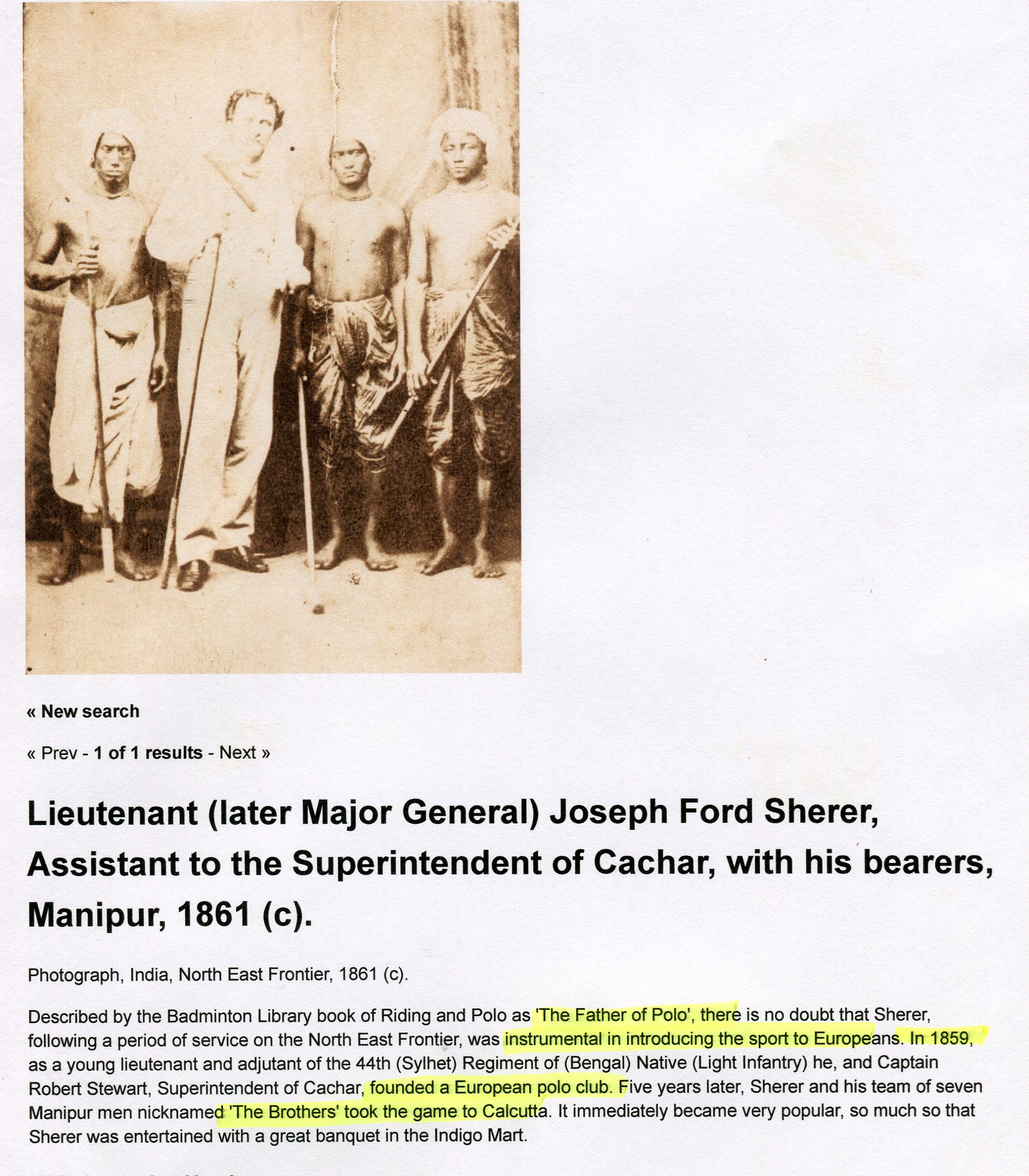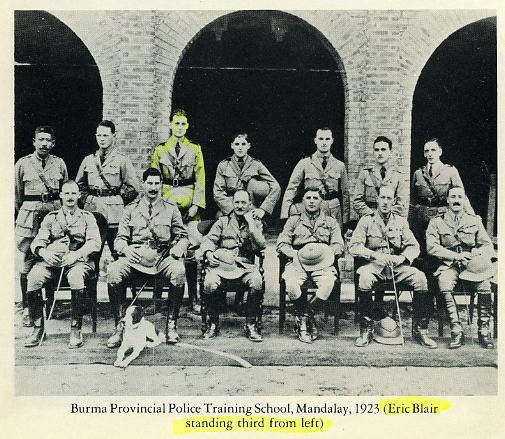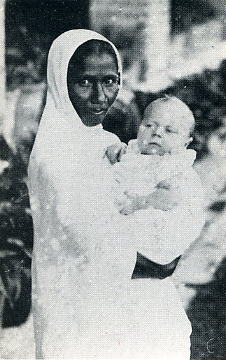ORWELL & POLO INDIA ORIGINS
Several polo historians have given credit to Lt Joseph Ford Sherer
of the British army's Sylhet Light Infantry
for transforming the traditional sagol kangjei into modern polo sometime around 1859.
From then on, polo caught the imagination of the nobility
and the British army who took the game to the west.
...cont'd from MOTIHARI DOC & NEWBORN ORWELL
To Orwell Today,
Dear Jackie Jura,
Thanks very much for your comprehensive reply to my query.
The existence of St. John's suggests a distinct community requiring several bungalows. Any records there going back to 1885 must have needed good care to survive.
My father's mother was Ada Sherer, whose father Joseph Ford Sherer was of some interest to historians of North-East India.
I look forward to any further clues which may emerge after your inclusion of my letter in "Orwell Today".
Best Wishes,
Charles Bovill
Greetings again Charles,
Yes, for the Motihari church to have baptism records going back to 1885 when your father was born or even to 1903 when Orwell was born will be a bit of a miracle -- but hopefully we'll hear from someone with info on St John's.
In the meantime, I googled your father's mother's father and WOW, you must be very proud of your family connection to not only Orwell (ie your father being born in the same Motihari bungalow) but also to polo -- your great-grandfather having invented the game! That defintely gives you bragging rights at parties and other social gatherings -- especially at polo games.
Here's some of his story:
Described by the Badminton Library book of Riding and Polo as 'The Father of Polo', there is no doubt that Sherer, following a period of service on the North East Frontier, was instrumental in introducing the sport to Europeans. In 1859, as a young lieutenant and adjutant of the 44th (Sylhet) Regiment of (Bengal) Native (Light Infantry) he, and Captain Robert Stewart, Superintendent of Cachar, founded a European polo club. Five years later, Sherer and his team of seven Manipur men nicknamed 'The Brothers' took the game to Calcutta. It immediately became very popular, so much so that Sherer was entertained with a great banquet in the Indigo Mart.

Silver tankard presented to Captain Joseph Ford Sherer
49th Bengal Native Infantry, by the Calcutta Hockey Club, February 1864
The game of polo is often referred to as the game of kings, combining horsemanship with speed and stamina. The modern game originated in the tiny north-eastern Indian state of Manipur, but is now under threat. Polo is still popular in Manipur, mainly because of the state's rare breed of polo ponies. Manipuri ponies are considered to be descendants of Asian wild horses and have been recognised as one of the five indigenous horse breeds of India. They are smaller than other breeds - but well loved for their stamina, speed and ability to survive in harsh weather conditions. However, conservationists say Manipuri ponies are now so far in decline that they are critically endangered. This is bad news for a state where horses and ponies are revered... Until a few decades ago, thousands of ponies roamed around the region. The Meitis, one of the major communities in the region, excelled in horsemanship and were even able to tame them. Manipuri legend says that Lord Marjing, the chieftain of the Chenglei tribe, introduced the game of sagol kangjei or horse hockey, widely regarded as the predecessor of modern day polo. To locals, the ponies even played a crucial role in Manipuri history. But the famed ponies are in danger of extinction. A survey conducted in 2003 showed that there were about 1,800 ponies in the state. But the number has now dwindled to about 500, triggering alarm among polo enthusiasts and pony lovers. Loss of grazing land, urbanisation and encroachment of wetlands are considered to be among the key reasons for the decline. Following an outcry, the Manipur Horse Riding and Polo Association has set up a pony breeding centre outside Imphal and the state government is giving them additional land. The government is also planning to set up another pony conservation centre near Lord Marjing temple. Conservationists warn that Manipuri ponies have now become critically endangered and without a massive effort, they could trot into extinction.
With Myanmar [Burma] to the east, China to the north, and the neighbouring Indian states of Nagaland and Assam, Manipuri rulers in the past often found themselves fighting battles. "Over the centuries, we have defended our territory from invaders, won battles and conquered land with the help of these ponies. That's why they occupy a special place in Manipuri society," says Ibungochoubi Ningthoukhongjam, secretary of the Manipuri Pony Society. When there was no war, Manipuris used the ponies to play sagol kangjei. It is not clear when exactly Manipuris started playing the game but some records indicate that it was as early as the first Century. The wetlands of Manipur provided a natural habitat for the ponies. Because they are semi-wild, their owners let their animals roam in the common wetlands. They were herded back as and when there was an occasion, like war, rituals or to play sagol kangjei. The traditional game attracted the attention of British colonial rulers in the 19th Century, who were fascinated by the horsemanship of the riders and the speed and endurance of the ponies. There are many theories regarding how polo as a game evolved over the centuries. Several polo historians have given credit to Lt Joseph Ford Sherer of the British army's Sylhet Light Infantry for transforming the traditional sagol kangjei into modern polo sometime around 1859. From then on, polo caught the imagination of the nobility and the British army who took the game to the west. "Though polo has gone through various changes over the decades, Manipuri ponies are the original polo ponies and Manipur is the birthplace of modern polo," asserts Mr Ibungochoubi.
~ end quoting BBC Indian Ponies ~
As seen in the map above, the place in India where your great-grandfather -- an officer in the Imperial Indian Army -- was stationed circa 1860 in Imphal -- is very close to the place in Burma where Orwell -- an officer in the Imperial Military Police -- was stationed circa 1926 in Katha.
Orwell wrote the thinly-disguised autobiographical novel BURMESE DAYS in 1934 describing his five years in Burma. Orwell is recognizable as timber-company employee Flory but is a composite of other characters too -- including Verrall, a member of the Imperial Military Police who comes to town (Katha disguised as Kyauktada) and steals the heart of Flory's love-interest, Elizabeth.
Polo plays a role in BURMESE DAYS. Below I've scanned and transcribed the excerpt where Flory is humiliated -- in front of Elizabeth -- by Verrall on the polo field.
...As he came out of the compound gate [Flory] saw that there was a new arrival at Kyauktada. A youth with a long spear like a needle in his hand was cantering across the maidan on a white pony. Some Sikhs, looking like sepoys, ran after him, leading two other ponies, a bay and a chestnut, by the bridle. When he came level with him Flory halted on the road and shouted good morning. He had not recognized the youth, but it is usual in small stations to make strangers welcome. The other saw that he was hailed, wheeled his pony negligently round and brought it to the side of the road. He was a youth of about twenty-five, lank but very straight, and manifestly a cavalry officer... He sat his horse as though he were part of it, and he looked offensively young and fit. His fresh face was tanned to the exact shade that went with his light-coloured eyes, and he was as elegant as a picture with his white buckskin topi and his polo-boots that gleamed like an old meerschaum pipe. Flory felt uncomfortable in his presence from the start.
'How d'you do?' said Flory. 'Have you just arrived?'
'Last night, got in by the late train.' He had a surly, boyish voice. 'I've been sent up here with a company of men to stand by in case your local bad-mashes start any trouble. My name's Verrall -- Military Police,' he added, not, however, inquiring Flory's name in return....
'Oh yes. We heard they were sending somebody. Where are you putting up?'
'Dak bungalow, for the time being... What a rotten maidan you've got here, haven't you? Pity they can't keep this stuff cut,' he added, swishing the dried-up grass with the point of his spear. 'Makes it so hopeless for polo or anything.'
'I'm afraid you won't get any polo here,' Flory said. 'Tennis is the best we can manage. There are only eight of us all told, and most of us spend three-quarters of our time in the jungle.'...
After this there was a silence. The tall, bearded Sikhs stood in a group round their horses' heads, eyeing Flory without much favour. It was perfectly clear that Verral was bored with the conversation and wanted to escape. Flory had never in his life felt so completely de trop, or so old and shabby. He noticed that Verrall's pony was a beautiful Arab, a mare, with proud neck and arching, plume-like tail; a lovely milk-white thing, worth several thousands of rupees. Verrall had already twitched the bridle to turn away, evidently feeling that he had talked enough for one morning.
'That's a wonderful pony of yours,' Flory said.
'She's not bad, better than these Burma scrubs. I've come out to do a bit of tent-pegging. It's hopeless trying to knock a polo ball about in this muck. Hey, Hira Singh!' he called, and turned his pony away.
The sepoy holding the bay pony handed his bridle to a companion, ran to a spot forty yards away, and fixed a narrow boxwood peg in the ground. Verral took no further notice of Flory. He raised his spear and poised himself as though taking aim at the peg, while the Indians backed their horses out of the way and stood watching critically. With a just perceptible movement Verrall dug his knees into the pony's sides. She bounded forward like a bullet from a catapult. As easily as a centaur the lank, straight youth leaned over in the saddle, lowered his spear and plunged it clean through the peg. One of the Indians muttered gruffly 'Shabash!' Verrall raised his spear behind him in the orthodox fashion, and then, pulling his horse to a canter, wheeled round and handed the transfixed peg to the sepoy.
Verrall rode twice more at the peg, and hit it each time. It was done with matchless grace and with extraordinary solemnity. The whole group of men, Englishman and Indians, were concentrated upon the business of hitting the peg as though it had been a religious ritual.... A thought occurred to him, one of those rash thoughts that usually lead to trouble. He called to Verrall, who was a few yards away from him, and pointed with his stick....
'Can these other two do it?' Flory repeated.
'The chestnut's not bad. Bolts if you let him, though.'
'Let me have a shot at the peg, would you?'
'All right,' said Verrall ungraciously. 'Don't go and cut his mouth to bits.'
A sepoy brought the pony, and Flory pretended to examine the curb- chain. In reality he was temporizing until Elizabeth should be thirty or forty yards away. He made up his mind that he would stick the peg exactly at the moment when she passed (it is easy enough on the small Burma ponies, provided that they will gallop straight), and then ride up to her with it on his point. That was obviously the right move. He did not want her to think that that pink-faced young whelp was the only person who could ride. He was wearing shorts, which are uncomfortable to ride in, but he knew that, like nearly everyone, he looked his best on horseback.
Elizabeth was approaching. Flory stepped into the saddle, took the spear from the Indian and waved it in greeting to Elizabeth. She made no response, however. Probably she was shy in front of Verrall. She was looking away, towards the cemetery, and her cheeks were pink.
'Chalo,' said Flory to the Indian, and then dug his knees into the horse's sides.
The very next instant, before the horse had taken to bounds, Flory found himself hurtling through the air, hitting the ground with a crack that wrenched his shoulder almost out of joint, and rolling over and over. Mercifully the spear fell clear of him. He lay supine, with a blurred vision of blue sky and floating vultures. Then his eyes focused on the khaki pagri and dark face of a Sikh, bearded to the eyes, bending over him.
'What's happened?' he said in English, and he raised himself painfully on his elbow. The Sikh made some gruff answer and pointed. Flory saw the chestnut pony careering away over the maidan, with the saddle under its belly. The girth had not been tightened, and had slipped round; hence his fall....
When Flory sat up he found that he was in extreme pain. The right shoulder of his shirt was torn open and already soaking with blood, and he could feel more blood oozing from his cheek. The hard earth had grazed him. His hat, too, was gone. With a deadly pang he remembered Elizabeth, and he saw her coming towards him, barely ten yards away, looking straight at him as he sprawled there so ignominiously. My God, my God! he thought, O my God, what a fool I must look! The thought of it even drove away the pain of the fall. He clapped a hand over his birth-mark, though the other cheek was the damaged one....
~ end quoting Burmese Days ~
All the best,
Jackie Jura
Myanmar town wants the secret out: George Orwell slept here, by Joe Freeman/Aung Naing Soe, Associated Press, Dec 12, 2016
A 12-hour train ride from Mandalay, Katha is a small, idyllic town in the Sagaing region. The atmosphere is as tranquil as the flowing Irrawaddy. As the sun sets, visitors and families stroll along the promenade as mountains darken in the distance. In the past five years, Myanmar has been rapidly modernizing, and Katha is no exception. There are shiny new bank branches and new hotels. Mobile phone shops proliferate. Many colonial buildings have been left alone, giving the place a timeless feel, though many structures are dilapidated. Both the tennis court and the prison are still in use. The British Club is now a local business cooperative. The Hotel Katha, which opened last year, has seized on the Orwell connection. Built to resemble a red-brick colonial home, it offers brochures at the front desk with maps guiding visitors to key sites from the novel. Guests can read copies of "Burmese Days" and Orwell's essays in the lobby or dine at the Kyauktada Cafe & Restaurant. Meeting rooms are named "Flory"..."Elizabeth" and "Macgregor" after three of the book's characters. "I want visitors to feel like they are in the book," said the owner, Bran Aung, in a phone interview. "I want to add more about Orwell. I am still collecting."
Lieutenant Joseph Ford Sherer with his bearers, Manipur, 1861, National Army Museum
Concern over dwindling number of rare Indian polo ponies, BBC, Jul 13, 2015
ORWELL & POLO INDIA ORIGINS



(Indian horse hockey transformed into polo)
MOTIHARI DOC & NEWBORN ORWELL


(grandfather Bovill delivered babies there)
Email, Jan 23, 2017
SHRINE TO ORWELL INDIA BIRTH
Jackie Jura
~ an independent researcher monitoring local, national and international events ~
email: orwelltoday@gmail.com
HOME PAGE
website: www.orwelltoday.com